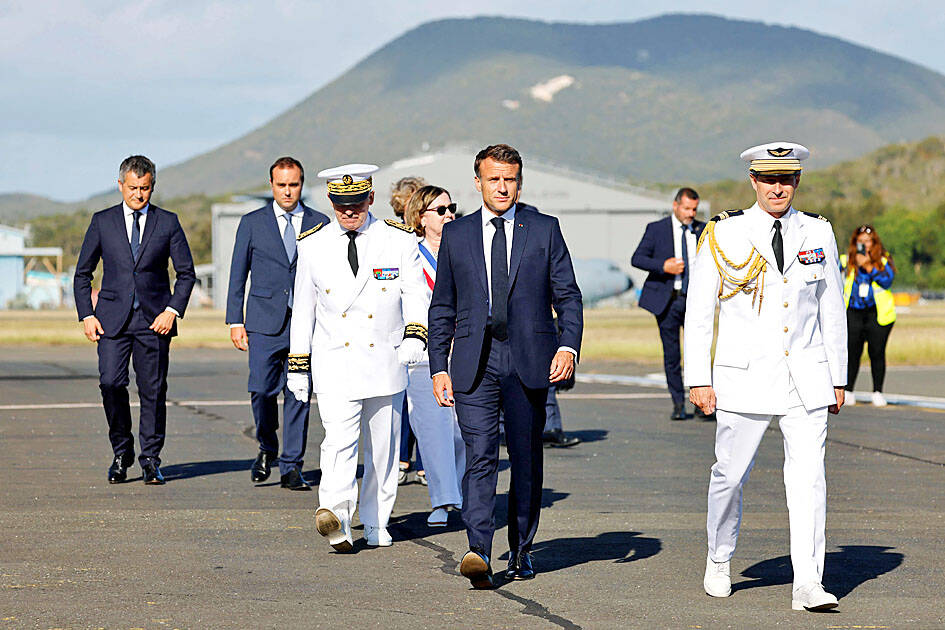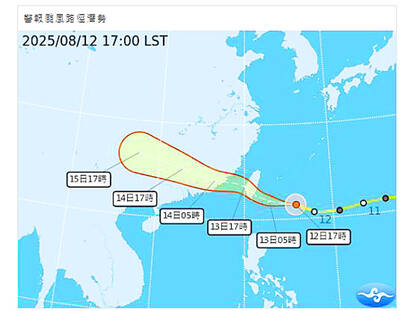French President Emmanuel Macron yesterday pushed on a visit to riot-hit New Caledonia for the removal of protesters’ barricades and said police sent in to help battle deadly unrest in the French Pacific archipelago “will stay as long as necessary,” even as security services back in France focus in coming weeks on safeguarding the Paris Olympics.
By canceling his previously announced schedule to fly across the globe from Paris to New Caledonia, Macron brought the weight of his office to bear on the crisis, which has left six dead and a trail of destruction on the archipelago where indigenous Kanak people have long sought independence from France.
Pro-independence Kanak leaders, who a week earlier declined Macron’s offer of talks by video, joined a meeting with the French leader hosted in the capital, Noumea, with rival pro-Paris leaders who want New Caledonia, which became French in 1853 under Napoleon III, to remain part of France.

Photo: AFP
Macron urged local leaders to use their clout to help restore order. He said a state of emergency imposed by Paris for at least 12 days on Wednesday last week to boost police powers could only be lifted if local leaders call for a clearing away of barricades that demonstrators and people trying to protect their neighborhoods have erected in Noumea and beyond.
The unrest continued to simmer as Macron jetted in, despite a 6pm to 6am curfew and more than 1,000 reinforcements for the archipelago’s police and gendarmes, now 3,000 strong.
“I will be very clear here. These forces will remain as long as necessary. Even during the Olympic Games and Paralympics,” Macron said.
At La Tontouta International Airport in Noumea, which remains closed to commercial flights, Macron on arrival said that he wanted “to be alongside the people and see a return to peace, calm and security as soon as possible.”
Later, at Noumea’s central police station, Macron thanked officers for facing what he described as “an absolutely unprecedented insurrection movement.”
“No one saw it coming with this level of organization and violence,” he said. “You did your duty, and I thank you.”
Macron flew to the archipelago under pressure from politicians in France and pro-independence supporters to delay or scrap the overhaul of the voting system for New Caledonia which triggered the unrest. It would enlarge voter numbers in provincial elections for New Caledonia’s legislature and government, adding about 25,000 voters, including people who have been residents of the archipelago for at least 10 years and others born there.
Opponents fear the measure would benefit pro-France politicians in New Caledonia and further marginalize the Kanaks, who once suffered from strict segregation policies and widespread discrimination.
Supporters say the proposed overhaul is democratically important for people with roots in New Caledonia who cannot currently vote for local representatives.
Macron in the past has facilitated dialogue between the divided pro and anti-independence camps. France’s efforts included three referendums from 2018 to 2021 which asked voters if they wanted independence. They voted no each time, but the last referendum in 2021 was boycotted by pro-independence forces.

DEFENSE: The first set of three NASAMS that were previously purchased is expected to be delivered by the end of this year and deployed near the capital, sources said Taiwan plans to procure 28 more sets of M-142 High Mobility Artillery Rocket Systems (HIMARS), as well as nine additional sets of National Advanced Surface-to-Air Missile Systems (NASAMS), military sources said yesterday. Taiwan had previously purchased 29 HIMARS launchers from the US and received the first 11 last year. Once the planned purchases are completed and delivered, Taiwan would have 57 sets of HIMARS. The army has also increased the number of MGM-140 Army Tactical Missile Systems (ATACMS) purchased from 64 to 84, the sources added. Each HIMARS launch pod can carry six Guided Multiple Launch Rocket Systems, capable of

GET TO SAFETY: Authorities were scrambling to evacuate nearly 700 people in Hualien County to prepare for overflow from a natural dam formed by a previous typhoon Typhoon Podul yesterday intensified and accelerated as it neared Taiwan, with the impact expected to be felt overnight, the Central Weather Administration (CWA) said, while the Directorate-General of Personnel Administration announced that schools and government offices in most areas of southern and eastern Taiwan would be closed today. The affected regions are Tainan, Kaohsiung and Chiayi City, and Yunlin, Chiayi, Pingtung, Hualien and Taitung counties, as well as the outlying Penghu County. As of 10pm last night, the storm was about 370km east-southeast of Taitung County, moving west-northwest at 27kph, CWA data showed. With a radius of 120km, Podul is carrying maximum sustained

Tropical Storm Podul strengthened into a typhoon at 8pm yesterday, the Central Weather Administration (CWA) said, with a sea warning to be issued late last night or early this morning. As of 8pm, the typhoon was 1,020km east of Oluanpi (鵝鑾鼻), Taiwan’s southernmost tip, moving west at 23kph. The storm carried maximum sustained winds of 119kph and gusts reaching 155kph, the CWA said. Based on the tropical storm’s trajectory, a land warning could be issued any time from midday today, it added. CWA forecaster Chang Chun-yao (張竣堯) said Podul is a fast-moving storm that is forecast to bring its heaviest rainfall and strongest

TRAJECTORY: The severe tropical storm is predicted to be closest to Taiwan on Wednesday and Thursday, and would influence the nation to varying degrees, a forecaster said The Central Weather Administration (CWA) yesterday said it would likely issue a sea warning for Tropical Storm Podul tomorrow morning and a land warning that evening at the earliest. CWA forecaster Lin Ting-yi (林定宜) said the severe tropical storm is predicted to be closest to Taiwan on Wednesday and Thursday. As of 2pm yesterday, the storm was moving west at 21kph and packing sustained winds of 108kph and gusts of up to 136.8kph, the CWA said. Lin said that the tropical storm was about 1,710km east of Oluanpi (鵝鑾鼻), Taiwan’s southernmost tip, with two possible trajectories over the next one